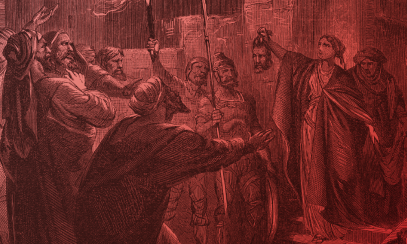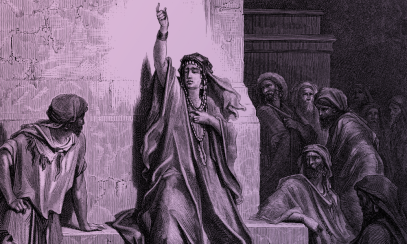
A Roadmap for Our Life in Christ – The Beatitudes
As we now move into the “Third Pillar” of the Catechism, we will learn that the new dignity we discover in Christ calls us to lead a new life that is “worthy of the Gospel of Christ.”
This new life is the life of communion with God, or beatitude. Because this is the end for which humanity was created, this pillar of the Catechism explores both beatitude and the ways of reaching it.
The Beatitudes, Part I
“The Beatitudes are at the heart of Jesus’ preaching ... They express the vocation of the faithful associated with the glory of his Passion and resurrection; they shed light on the actions and attitudes characteristic of the Christian life; they are the paradoxical promises that sustain hope in the midst of tribulations; they proclaim the blessings and rewards already secured, however dimly, for Christ’s disciples ...”
Blessed are the poor in spirit, for theirs is the kingdom of heaven.
In the Garden of Eden, we know our first parents succumbed to the suggestion of the serpent that there was somehow a lack in their relationship with God and that there was something they could do about it. Rather than being of the same mind, love and heart of God, our first parents chose to take matters into their own hands in order to “fill themselves” with what they lacked.
In order to restore the proper relationship with God, Jesus, who is Love, demonstrated to us through the witness of his life the proper attitude we must adopt. In short, we must be like Jesus, “who, though he was in the form of God, did not regard equality with God something to be grasped. Rather he emptied himself, taking the form of a slave, coming in human likeness; and found human in appearance, he humbled himself, becoming obedient to death, even death on a cross.” (Phil 2:6-8)
To re-enter communion with God then, we, too, must turn from a disordered ego and its self-reliance to the attitude of Christ. One rich in the spirit of the disordered self will forever be blinded to the one true thing it really lacks: love. Instead, he or she will constantly grasp for that which is beyond his or her reach, will seek to remake the world in his image and will demand that everyone else conforms to her way of viewing the world. The challenge for us today continues to be to empty ourselves of pride, of a false sense of own divinity.
Blessed are those who mourn, for they shall be comforted.
Words can manipulate. Words can be double-edged or have multiple meanings. Words also can be a source of great pride. Our society values and praises those who are never at a loss for words. We are moved by talented writers and inspired by our great orator.
In contrast, all genuine tears and cries are the recognition of limits; that we are no longer in control. Tears come when words fail us. Tears are pure because they come from the depths of a person’s being to express a need and desire that cannot be expressed in words. The tears that originate from a deeply felt hurt, loss, affliction or need leave no doubt in the hearer as to the existence of the pain or need. In this way, true tears hide nothing; they have no hidden agenda.
Crying also affirms our dependence on something or someone other than ourselves – a message that many of us would rather not hear. Like a baby, we must trust that God will hear our cries and will understand their meaning. We must trust that God will penetrate through the tears to the underlying need, i.e. reconciliation or removal from all that seeks to separate us from God, whether we are aware of this or not.
Blessed are the meek, for they shall inherit the earth.
The word meek connotes patience, mildness, gentleness, kindness and disinclination towards anger and resentment. Meekness is both a natural outgrowth of poverty of spirit and an essential ingredient for poverty of spirit. Only one who has emptied himself or herself of the false ego can exercise patience and kindness because these require a person to not put his or her own self with its demands as primary.
Meekness, simply put, is a fruit of the Spirit and therefore only blossoms to the extent that we participate in the life of the Spirit. To be meek then is to be like Christ, which is only possible when the mind of Christ wells up within us.
– Quotes from the Catechism (1691-1729) unless otherwise noted.
Catechism Quiz
Which of the following is not a source of the morality of a human act?
a. the conscience of the actor
b. the object chosen
c. the end or intention
d. the circumstances of the action
Answer: (a) the conscience of the actor. The object, intention and circumstances make up the sources, or constitutive elements, of the morality of human acts. (CCC 1750)
Doug Culp is the CAO and secretary for pastoral life for the Diocese of Lexington, Ky. He holds an MA in theology from Catholic Theological Union in Chicago.



